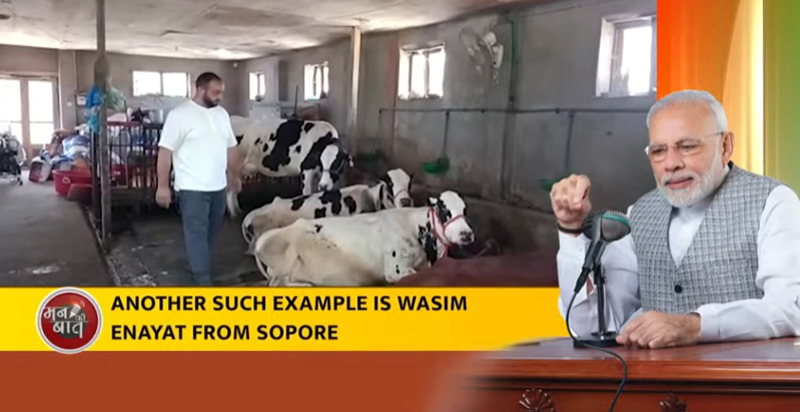
‘Collective will of people can achieve any goal’
*Baramulla turning into symbol of white revolution
Sanjeev Pargal
JAMMU, June 18: Prime Minister Narendra Modi said today that nowadays there has been a lot of discussion about Jammu and Kashmir in the country due to rising tourism and spectacular conduct of G20 event last month.
He mentioned this while addressing monthly programme `Mann Ki Baat’ on All India Radio this morning.
Modi also spoke about Baramulla district turning into a symbol of new white revolution with efforts of local people including women.
“Nowadays, there has been a lot of discussion about Jammu and Kashmir in the country due to rising tourism and spectacular events of G20,” the Prime Minister said referring to heavy tourist footfall in the Union Territory and successful conduct of Tourism Working Group (TWG) meeting of G20 in Srinagar last month.
There has been heavy rush of tourists in Jammu and Kashmir and it is expected to further go up with start of annual pilgrimage of Shri Amarnath Ji shrine in South Kashmir Himalayas from July 1 to August 31. Three-day long G20 meeting in Srinagar attended by a large number of international delegates was also a success as it was conducted peacefully.
Modi said that Jammu and Kashmir’s Baramulla district has been turning into a symbol of new white revolution and referred to youth who have come forward to do dairy farming.
He said due to hard work of such people, 5.5 lakh liters of milk is being produced daily in Baramulla district of the Kashmir Valley.
Recalling that some time back he had mentioned how Lotus Stems (Nadru) of Kashmir are being relished outside the country, Modi said now the people of Baramulla district have done a wonderful job in dairy farming.
“Farming has been going on in Baramulla for a long time but there was shortage of milk. People of Baramulla took this challenge as an opportunity and a large number of people started dairy farming there,” he said.
He added that the women were also in forefront of this task including Ishrat Nabi, a Graduate, who started Mir Sisters Dairy Farm.
The Prime Minister said about 150 litres of milk is being sold every day from their dairy farm. Similarly, Wasim Anayat from Sopore has more than two dozen animals and he also sells more than 200 litres of milk every day.
Click here to watch video
“Another youth Abid Hussain is doing dairy farming. His work is also progressing a lot,” he added.
Modi said due to hard work of such people, 5.5 lakh litres of milk is being produced daily in Baramulla turning the district into symbol of a new white revolution.
“During last two and a half to three years, more than 500 dairy units have come up. The dairy industry of Baramulla is a testimony to the fact that every part of our country is full of possibilities. Collective will of the people of a region can achieve any goal,” the Prime Minister said.
Meanwhile, Lieutenant Governor Manoj Sinha has expressed heartfelt gratitude to Prime Minister Narendra Modi for referring to new white revolution in Baramulla district.
“Heartfelt gratitude to PM Narendra Modi. Congratulations to Dr Syed Sehrish Asghar, team DC Baramulla. It’s a shining example of our commitment to create a peaceful, prosperous, self-reliant and self-confident Jammu and Kashmir Union Territory,” Office of LG J&K tweeted.
PTI adds: Describing the Emergency a “dark period” in India’s history, Prime Minister Narendra Modi today said those who supported democracy at that time were tortured and a glance at such crimes endangering the country’s freedom would make it easier for the young generation to understand the meaning and significance of democracy.
In his monthly ‘Mann Ki Baat’ radio broadcast, Modi said India is the mother of democracy and “we consider our democratic ideals as paramount and our Constitution supreme”.
“Therefore, we can never forget June 25th. This is the very day when Emergency was imposed on our country. It was a dark period in the history of India,” the prime minister said.
“Lakhs of people opposed the emergency with full might. The supporters of democracy were tortured so much during that time, that even today thinking about it, makes us shudder,” he said.
Noting that many books have been written on these atrocities and punishments meted out by the police and administration, Modi said he had also written a book named “Sangharsh Mein Gujarat” at that time.
“A few days ago, I came across another book written on the Emergency – “Torture of Political Prisoners in India”. This book, published during the Emergency, describes how, at that time, the government was treating the guardians of democracy most cruelly,” he said, adding that there are many case studies in this book.
“I wish that, today, when we are celebrating the Azadi Ka Amrit Mahotsav, we must also take a glance at such crimes which endanger the freedom of the country. This will make it easier for today’s young generation to understand the meaning and significance of democracy,” the prime minister said.
Emergency was imposed in 1975 by the then Congress government led by prime minister Indira Gandhi.
Modi also said that he was holding his ‘Mann ki Baat’ radio broadcast on June 18 instead of the last Sunday of the month as he will be travelling to the United States next week.
He said during his visit, he will get an opportunity to participate in the International Yoga Day programme at the United Nations headquarters in New York.
“I appeal to all of you to adopt Yoga in your life and make it part of your daily routine,” he said.

